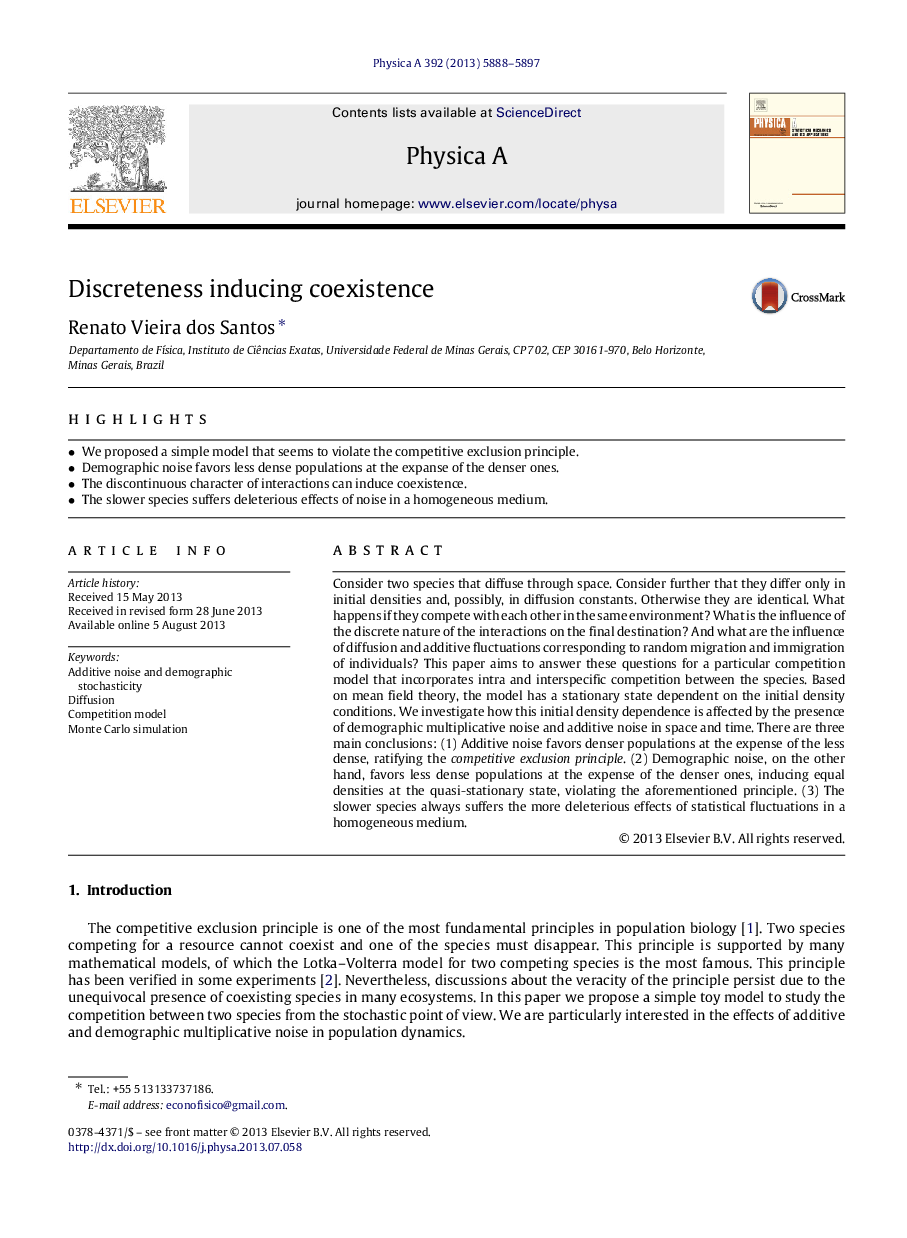| کد مقاله | کد نشریه | سال انتشار | مقاله انگلیسی | نسخه تمام متن |
|---|---|---|---|---|
| 10480881 | 933005 | 2013 | 10 صفحه PDF | دانلود رایگان |
عنوان انگلیسی مقاله ISI
Discreteness inducing coexistence
ترجمه فارسی عنوان
بی اعتنایی همزیستی را منجر می شود
دانلود مقاله + سفارش ترجمه
دانلود مقاله ISI انگلیسی
رایگان برای ایرانیان
کلمات کلیدی
سر و صدای افزایشی و تصادف جمعیت شناختی، نفوذ، مدل رقابت، شبیه سازی مونت کارلو،
ترجمه چکیده
دو گونه را که از طریق فضا پخش می شوند، در نظر بگیرید. بیشتر در نظر بگیرید که فقط در تراکم اولیه و، احتمالا در دائمی انتشار، متفاوت است. در غیر این صورت آنها یکسان هستند چه اتفاقی می افتد اگر آنها با یکدیگر در یک محیط رقابت کنند؟ تاثیر ماهیت گسسته تعاملات بر مقصد نهایی چیست؟ و تاثیر انتشار و نوسانات افزایشی مربوط به مهاجرت تصادفی و مهاجرت افراد چیست؟ این مقاله با هدف پاسخ به این سوالات برای یک مدل رقابت خاص است که شامل رقابت بین و بین گونه ای بین گونه ها می شود. بر اساس میانگین تئوری میدان، مدل دارای حالت ثابت است که وابسته به شرایط تراکم اولیه است. ما بررسی می کنیم که چگونه این وابستگی اولیه چگالی توسط حضور سر و صدا چند ضلعی جمعیتی و نویز افزایشی در فضا و زمان تحت تاثیر قرار می گیرد. سه نتیجه گیری اصلی وجود دارد: (1) سر و صدایی افزایشی، به نفع جمعیت های متراکم تر به نفع ضعیف تر است، و اصل تصویب رقابت را تصویب می کند. (2) از سوی دیگر، سر و صدای جمعیتی، به نفع جمعیت های متراکم تر به نفع چسبنده تر است، باعث ایجاد چگالی مساوی در حالت نیمه ثابت و نقض اصل فوق می شود. (3) گونه های کندتر همیشه از اثرات زیان آور نوسانات آماری در محیط یکنواخت رنج می برند.
موضوعات مرتبط
مهندسی و علوم پایه
ریاضیات
فیزیک ریاضی
چکیده انگلیسی
Consider two species that diffuse through space. Consider further that they differ only in initial densities and, possibly, in diffusion constants. Otherwise they are identical. What happens if they compete with each other in the same environment? What is the influence of the discrete nature of the interactions on the final destination? And what are the influence of diffusion and additive fluctuations corresponding to random migration and immigration of individuals? This paper aims to answer these questions for a particular competition model that incorporates intra and interspecific competition between the species. Based on mean field theory, the model has a stationary state dependent on the initial density conditions. We investigate how this initial density dependence is affected by the presence of demographic multiplicative noise and additive noise in space and time. There are three main conclusions: (1) Additive noise favors denser populations at the expense of the less dense, ratifying the competitive exclusion principle. (2) Demographic noise, on the other hand, favors less dense populations at the expense of the denser ones, inducing equal densities at the quasi-stationary state, violating the aforementioned principle. (3) The slower species always suffers the more deleterious effects of statistical fluctuations in a homogeneous medium.
ناشر
Database: Elsevier - ScienceDirect (ساینس دایرکت)
Journal: Physica A: Statistical Mechanics and its Applications - Volume 392, Issue 23, 1 December 2013, Pages 5888-5897
Journal: Physica A: Statistical Mechanics and its Applications - Volume 392, Issue 23, 1 December 2013, Pages 5888-5897
نویسندگان
Renato Vieira dos Santos,
